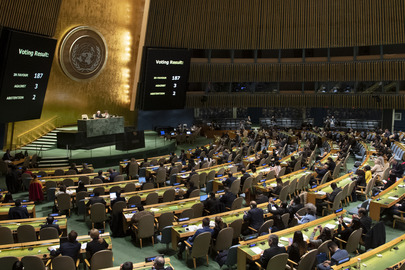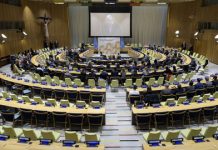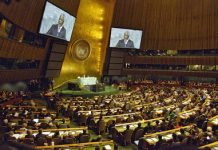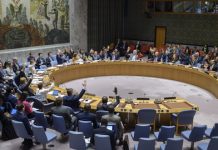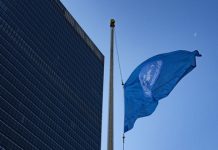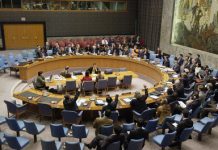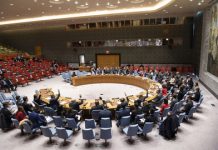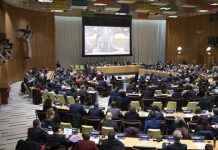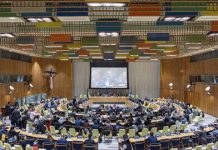This is the News in Brief from the United Nations.
Chief of key UN agency in Gaza warns ‘entire generation’ could be lost
The head of the main UN agency responsible for Palestinian refugees, UNRWA, issued a stark warning on Monday that it “will crumble” unless funding is found quickly.
An “entire generation” of children are also at risk of being condemned to “poverty…hatred, resentment and future conflict”, said UNRWA Commissioner-General Philippe Lazzarini.
Speaking in Geneva, he explained that the agency was “staggering under the weight of relentless attacks in Gaza”, after nearly nine months of intense Israeli bombardment and ground operations.
Mr. Lazzarini described how Gazans were “clinging to life” and repeatedly displaced across the enclave’s ravaged territory.
“Palestinians and Israelis have experienced terrible losses and suffered immensely. Gaza has been decimated for more than two million Gazans. It is a living hell, a nightmare from which they cannot wake. Catastrophic levels of hunger across the Gaza Strip as a result of human action. Children are dying of malnutrition and dehydration, while food and clean water wait in trucks.”
In addition to the 193 UNRWA personnel killed since Hamas-led terror attacks and hostage-taking sparked the war, Mr. Lazzarini reported that more than 180 of the agency’s premises have been damaged or destroyed since 7 October.
“At least 500 people” have been killed while seeking protection under the UN flag, the UNRWA chief continued, adding that UNRWA premises “have been used for military purposes by Israel, Hamas and other Palestinian armed groups”.
Equally worrying was the fact that operational space for humanitarians “is shrinking”, Mr. Lazzarini warned, while aid convoys “have come under attack, despite coordinated movement with Israeli authorities in the West Bank”.
Time to end war on drugs, Human Rights Council hears
To the Human Rights Council in Geneva, where a top independent rights expert has called for an end to the so-called war on drugs – describing it instead as a war on people.
Tlaleng Mofokeng, Special Rapporteur to health, insisted that punitive approaches to drug use and drug control affected society’s most vulnerable people.
Ms. Mofokeng, who does not work for the UN, said that the lack of a human-rights based approach to addressing drug use has particularly harmed those facing homelessness, poverty, people and mental health problems, along with other marginalized individuals including sex workers, women, children, LGBTIQA+ persons, Black and indigenous peoples.
The rights expert insisted that the criminalization of drug use was the single most extreme option within a raft of other regulatory options available to governments, while the lack of access to harm reduction services for drug users in prisons “lead to a high prevalence of HIV, hepatitis C and tuberculosis”, she said.
In support of the “full decriminalisation” of drug use, the rights expert insisted that evidence from authorities that took this approach “demonstrates that adopting less punitive policies does not result in an increase in drug use, drug-related harms or other crimes.”
Sudan: New low as El Fasher maternity hospital comes under attack
Heavy fighting in Sudan hit a new low at the weekend when a maternity hospital in besieged El Fasher city came under attack.
A pharmacy worker on duty in the hospital was among those killed and injured, prompting new calls on Monday from the head of the UN World Health Organization (WHO), Dr Tedros Ghebreyesus, for the violence to stop.
In a social media post Tedros said that the Saudi Maternity Hospital was the only one providing maternal and child healthcare in El Fasher, as he called on the warring parties to “protect mothers and children at all times and allow them safe access to healthcare”.
The development comes after more than 14 months of fighting between rival militaries in Sudan.
Media reports pointed to “a Rapid Support Forces bombing” of the hospital in El Fasher, which is the capital of the Darfur region and home to hundreds of thousands of people displaced by the war.
Calls from the UN and the international community have grown in recent weeks to prevent Sudan from falling into a humanitarian catastrophe that could push millions into starvation, owing to food shortages caused by fighting that has spread to 12 of the country’s 18 states.
Daniel Johnson, UN News.
Source of original article: United Nations (news.un.org). Photo credit: UN. The content of this article does not necessarily reflect the views or opinion of Global Diaspora News (www.globaldiasporanews.com).
To submit your press release: (https://www.globaldiasporanews.com/pr).
To advertise on Global Diaspora News: (www.globaldiasporanews.com/ads).
Sign up to Global Diaspora News newsletter (https://www.globaldiasporanews.com/newsletter/) to start receiving updates and opportunities directly in your email inbox for free.


